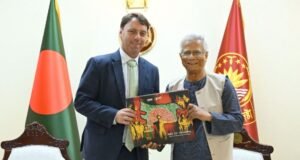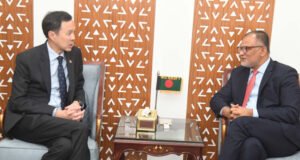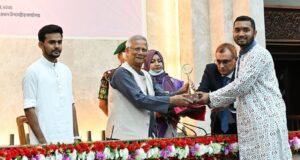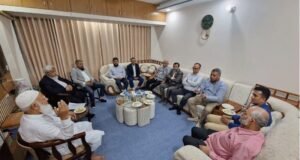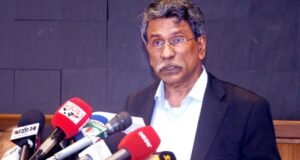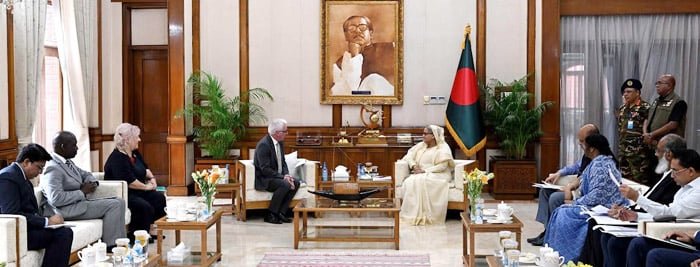
Global Fund and Stop TB Partnership wants to include Prime Minister Sheikh Hasina in their coalition of leaders and champion of global fund.
Global Fund Executive Director Peter Sands and Stop TB Partnership Executive Director Dr Lucica Ditiu today made the plea when they paid a courtesy call on her at her official residence Ganabhaban.
Indian Prime Minister Narendra Modi and Brazilian President Luiz Inácio Lula da Silva, among others, are in the lists of their coalition of leaders, said Prime Minister’s Press Secretary Md Nayeemul Islam Khan while briefing the reporters after the meeting.
Mentioning that these two organisations basically work in Bangladesh on TB, HIV and Malaria and its funding, he said, “They wanted to expand and deepen their relations with Bangladesh.”
The Press Secretary said that they actually wanted that Prime Minister Sheikh Hasina would utilise her contacts and networks with the world leaders for fund mobilisation.
He said that both the executive directors highly praised the Prime Minister, referring to her in-depth knowledge regarding TB, HIV and Malaria and mentioned it as “amazing”.
Md Nayeemul Islam Khan also highlighted that the malaria in Bangladesh except hilly areas are under control while the HIV situation of Bangladesh is also under control. “They will showcase these achievements of Bangladesh under the leadership of Prime Minister Sheikh Hasina,” he said.
To this regard, they invited the Prime Minister to attend an event of them in the coming days. “If you join, the success stories of Bangladesh would be showcased in the world arena. And the demand of Bangladesh will also be strengthened through it,” the two executive directors told the Premier.
They mentioned that Bangladesh has already achieved these successes already and if it (Bangladesh) gets some more assistance, then it can attain more success to reach the final target which is –elimination of these diseases.
During the meeting, Global Fund Executive Director Peter Sands and Stop TB Partnership Executive Director Dr Lucica Ditiu claimed that every year some 40,000 persons died in Bangladesh due to TB related issues.
The Press Secretary said that Prime Minister Sheikh Hasina differed with the number and asked the health ministry officials, who were present at the meeting, about it. They said that as per their data some 26,000 to 27,000 persons of the country died of TB in the country.
“Prime Minister Sheikh Hasina asked for a survey to figure out the death numbers due to TB,” said Md Neyeemul Islam Khan.
Global Fund will support Bangladesh in this regard.
They will also help Bangladesh to conduct Mobile diagnostics development in the country with the AI inducted hi-tech X-ray machine for quicker identification of the TB.
The Press Secretary mentioned that the Prime Minister and the executive directors put emphasis on the continuation of the efforts to contain HIV related issues of the country.
“We must not stop our efforts to face the HIV related issues although Bangladesh is doing very well regarding the issue. This must not create self complacency, which could bring bad news,” they agreed.
Sheikh Hasina said that the awareness programme must continue more strongly so that Bangladesh’s achievement is not affected and the country is put in a better position.
Malnutrition and cleanliness programme should help the fight against TB, she said.
They are very keen to build the success further and ready to secure funding for Bangladesh, Md Nayeemul Islam khan added.
Regarding the community clinic issue, the Prime Minister briefly described the activities and how it is helping the rural community people.
Health and Family Welfare Minister Dr Samanta Lal Sen, State Minister for Health Dr Rokeya Sultana and PMO Secretary Mohammad Salahuddin, among others, were present
The Global Fund is a worldwide partnership to defeat HIV, TB and malaria and ensure a healthier, safer, more equitable future for all.
They raise and invest more than US$5 billion a year to fight the deadliest infectious diseases, challenge the injustice that fuels them, and strengthen health systems and pandemic preparedness in more than 100 of the hardest hit countries.
In 2022, the Global Fund disbursed a record US$5.2 billion to fight HIV, TB and malaria, support COVID-19 Response Mechanism (C19RM) activities and strengthen the systems for health that underpin any pandemic response.
They unite world leaders, communities, civil society, health workers and the private sector to find solutions that have the most impact, and take them to scale worldwide.
The Stop TB Partnership is a hosted entity of the United Nations Office for Project Services (UNOPS), with its Secretariat based in Geneva, Switzerland.
Established in 2000, the Partnership aligns 1,600 partner organizations (including international and technical organizations, government programmes, research and funding agencies, foundations, NGOs, civil society and community groups, and the private sector) all over the world, leading global advocacy to end tuberculosis (TB).
Together with its partners, the Stop TB Partnership is a collective force that is transforming the fight against TB globally. Through the Partnership’s Secretariat and working with all partners, it ensures a clear identity for the TB community, high-level engagement and representation.
The Partnership also identifies and funds innovative approaches to find, treat and cure people affected by TB. It plays a key role in procuring TB drugs and diagnostics, including the roll-out of new tools across the world. The Partnership’s market-shaping strategy also helps to reduce prices, improve forecasting and prevent stock-outs for drugs.
The Stop TB Partnership is empowering communities and key populations, strengthening community systems and promoting community leadership in the TB response, focusing efforts on ensuring that responses are people-centered, rights-based and gender transformative.
 Weekly Bangla Mirror | Bangla Mirror, Bangladeshi news in UK, bangla mirror news
Weekly Bangla Mirror | Bangla Mirror, Bangladeshi news in UK, bangla mirror news


